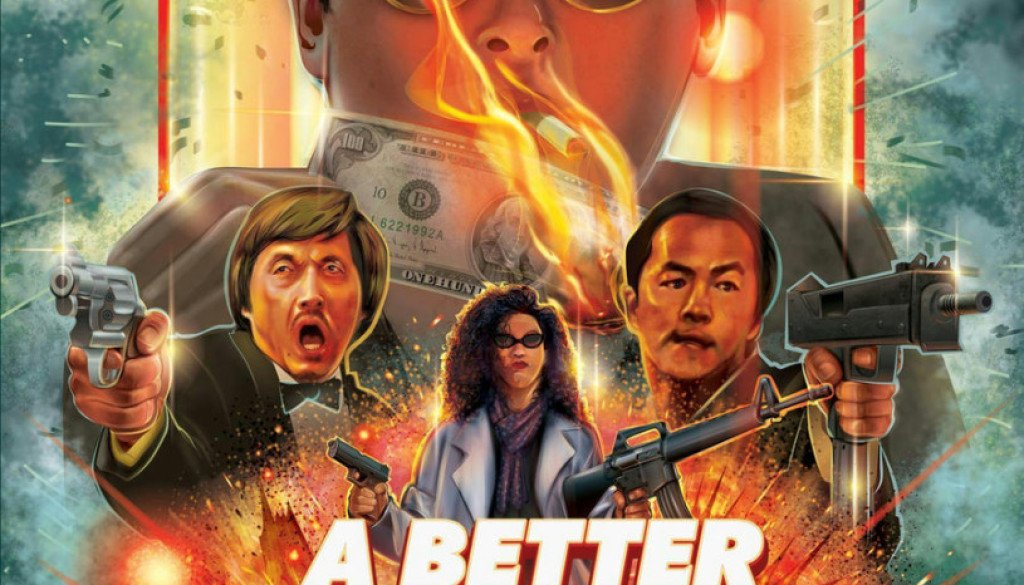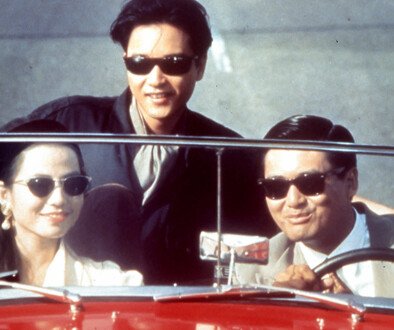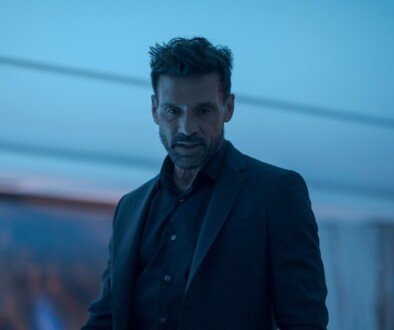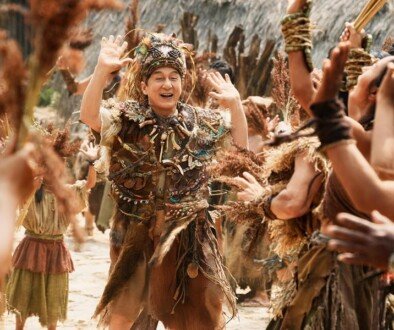A BETTER TOMORROW II – Shout! Review: John Woo’s Fully-Loaded Sequel Maxes Out With Guns Blazing!
It was only in the past decade or so that I learned that there was a whole trilogy attributed to John Woo’s 1986 crime thriller, A Better Tomorrow. I don’t even think I saw those films as “Out Of Print” listings back when I was a HKFlix customer, or even on YesAsia for that matter. To add, years earlier, there was one film on VHS that I rented that was surreptitiously attributed as one of Woo’s A Better Tomorrow films and it turned out to be a lemon.
Alas, I was convinced that only one of the supposed three actually existed and got viable DVD releases, and I was fine with that. Color me stupefied when I saw that Shout! Studios announced its acquisition of the Golden Princess library which includes the (very real) A Better Tomorrow Trilogy. With the first film in our wake, we’re diving into the second film of the bunch, A Better Tomorrow 2, and in quick sum, it’s definitely more of a mixed bag than the first.
Locked away in prison following the events of the first film, Tse-Ho (Ti Lung) is proffered a chance at parole in exchange for helping an inspector make the biggest bust of his career by bringing down Tse-ho’s old mentor, Lung-Tze (Dean Shek), a former triad working his way out to become a legit businessman, the propulsive underworld forces that keep pulling him back be damned. His reluctance to aid the inspector eventually leads to Kit’s involvement as an undercover operative, a mission he’s forced to keep secret from his pregnant wife, Jackie (Emily Chu).
With Jackie concerned and urging Tse-Ho to find out more, he obliges the inspector and reunites with Lung-Tze as a prison escapee desperate for work and a place. The plot thickens when one of Lung-Tze’s rivals attempts to have him assassinated during a banquet following a deal gone south. In a split second, the whole scheme goes sideways with Lung-Tze framed for murder, traumatized, and forced to flee to New York City with help from Tse-Ho and his former taxi cab boss, Ken (Kenneth Tsang).
This is where A Better Tomorrow 2 gets a tad wonky, when Tse-Ho meets up with an “Uncle Chan” who grew fond of Ho’s stories enough to illustrate them in drawings and on canvas (same day update: I was just reminded that Uncle Chan also appears in the first film as the CG operator of Mark and Tse-Ho’s counterfeiting operation); Through artistic incarnations of our main protagonist, we then meet Ken (Chow Yun-Fat), twin brother to Mark from the first film. Ken happens to live in the Big Apple where he runs a restaurant and deals with his own assortment of mobster riff-raff who insist on extorting him.
Meanwhile, Lung-Tze is attacked by seemingly random hitmen upon visiting a friend, rendering him in complete shock from the imminent tragedy and violence around him, so much so that he’s taken into a mental facility where, interestingly enough, Ken finds Lung-Tze and takes him into his home. It’s an uphill battle from then on as Ken deters to help Lung-Tze pull himself out of entropy. Thankfully, albeit slow to pass, there’s progress had in their efforts, even as armed gunmen descend onto their hiding locations.
There’s a lot of moving pieces throughout this film, but at least one other key aspect of the story is Tse-Ho’s infiltration into Lung-Tze’s former organization, now run by Ko Ying-Pui (Kwan Shan). It takes a while before our core protagonists convene for the film to finally take off and right then, our heroes finally have a team objective, with Ko squarely discovered as the man behind all of Lung-Tze’s turmoil. With Lung-Tze determined to take his own organization down, what ensues is an all out war of vengeance and retribution.
It’s easy to end up tuning out midway and losing track in A Better Tomorrow 2. A slightly longer runtime accommodates Woo’s continuing crime saga lined with character favorites and interesting new additions to the franchise that bring something worthwhile to its fruition. The most problematic aspect to this sequel is the priority of shoehorning Chow into the mix; Chow invaribaly brings a discernible veracity to his performance with a similar spirit and vigor that he delivers in his on-screen twin predecessor, and it especially works wonders when its time for Woo to get the fireworks going.
Unfortunately, not even Chow’s presence can help Woo’s all-or-nothing sequel keep up with itself at times. Its ambition strains to extend itself to it starpower and character arcs and fails at times to connect all the dots and coalesce the important pieces needed to make A Better Tomorrow 2 feel whole. The only thing left to do by the last ten or so minutes when all the supporting characters run their course is to essentially give the fans what they paid for: Watching Chow strut his way into a big house armed with guns, raybans and a trench coat full of grenades and go ham on a bunch of triad fools, unleashing as much satiating cinematic violence as possible, with co-lead Ti donning a katana as soon as he runs out of bullets. One guy picks up a fucking battle axe. Crazy shitters.
I did deliberately left out a few key scenes in this write-up for anyone else who is new to the trilogy, which I don’t think takes anything away from this analysis. At any rate, and as far as heroic bloodshed and bullet ballet goes, A Better Tomorrow 2 is a sequel that pays its dues without question. Compared to Woo’s career-changing inaugural hit, it rides the fanservice hard and plenty, although it does so at the expense of what could have been – and probably should have been – a more solid story, with or without the bankable leading man that helped launch this franchise.

And not for nothing, either. Woo himself didn’t want to do a sequel to the film, whereas prequel would have made better sense, creatively. The director goes into all of the ins and outs of this and more in the Blu-Ray disc’s twenty-six minute interview segment, “A Tumultuous Tomorrow”. The extras continue with “Better Than Ever,” an eighteen-minute interview with film expert, physical media insider and New York Asian Film Festival veteran Frank Djeng who offers a complimentary history and view into the film’s development, even personally calling it his favorite film out of the trilogy.
Author and critic Grady Hendrix keeps the momentum going in another Hong Kong Confidential featurette with a look at A Better Tomorrow 2, and its beleagured production faced with urgency by studio execs eager to capitalize off the success of the first film even after trashing earlier work-in-progress screenings. Hendrix also expands on the performances of its cast, including that of Chow whose performance magnetized him to every producer with an action script to throw at his feet, and also talks about the fallout between Woo and Hark which resulted in both going their seperate ways leading up to the latter’s third helmer in the franchise.
Additionally, Hendrix talks about how the crew managed to find Shek for his key role in the film, outlining how Shek was in a pretty dark place at this juncture of his career and was basically ready to leave the Hong Kong film industry altogether before Woo and Hark finally caught up to him. It’s really interesting stuff, particularly when discussing Shek’s approach to the role of Lung-Tze with a timely comparison to that of distinguished actor Tatsuya Nakadai’s character in Akira Kurosawa’s propulsive “King Lear” reimagining, Ran; I say “timely considering that the late Nakadai-san just passed away this week at the age of 92.
The A Better Tomorrow 2 disc rounds out with a trailer reel and a photo slideshow of up to 38 images, with the feature film in optional Cantonese audio and English dub, and a commentary track by James Mudge. The audio options also extend to the film’s accompanying 4K disc among the A Better Tomorrow Trilogy boxset which you can now find over at Shout! Factory’s new online store at Gruv.
Special thanks to reader Eddie Feng chiming in via e-mail about the film and offering a correction to update with.
Native New Yorker. Been writing for a long time now, and I enjoy what I do. Be nice to me!





